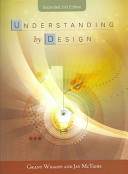UbD Three-Stage Template
To help educators start with the goal, rather than the learning activity, UbD employs a three-stage template.
• Stage 1—Identify desired results: In the first stage, you consider your big ideas and learning goals and prioritize them.
• Stage 2—Determine acceptable evidence: In the next stage, you “think like an assessor” (p. 18) to select the means for collecting and validating evidence students grasped your learning goals.
• Stage 3—Plan learning experiences and instruction: In the final stage, you design the instructional activities you will use to reach your desired results.
[...]
You probably know the saying, “If you don’t know exactly where you are headed, then any road will get you there.” Alas, the point is a serious one in education. We are quick to say what things we like to teach, what activities we will do, and what kinds of resources we will use; but without clarifying the desired results of our teaching, how will we ever know whether our designs are appropriate or arbitrary? How will we distinguish merely interesting learning from effective learning? More pointedly, how will we ever meet content standards or arrive at hard-won student understandings unless we think through what those goals imply for the learner’s activities and achievements?
[...]
Our lessons, units, and courses should be logically inferred from the results sought, not derived from the methods, books, and activities with which we are most comfortable. Curriculum should lay out the most effective ways of achieving specific results. It is analogous to travel planning. Our frameworks should provide a set of itineraries deliberately designed to meet cultural goals rather than a purposeless tour of all the major sites in a foreign country. In short, the best designs derive backward from the learnings sought.
Notes:
The basic methodology to backwards design in teaching.
Folksonomies: education teaching
Taxonomies:
/travel (0.438659)
/art and entertainment/visual art and design/design (0.420336)
/education (0.409962)
Keywords:
three-stage template (0.943117 (positive:0.539959)), UbD Three-Stage Template (0.843160 (positive:0.460606)), hard-won student understandings (0.687025 (positive:0.466104)), backwards design (0.480103 (positive:0.460606)), basic methodology (0.475505 (positive:0.460606)), learning activity (0.457488 (positive:0.232284)), big ideas (0.448486 (positive:0.492639)), acceptable evidence (0.446938 (positive:0.378030)), purposeless tour (0.438289 (positive:0.522385)), results (0.430923 (positive:0.671299)), learning experiences (0.425534 (neutral:0.000000)), final stage (0.424788 (neutral:0.000000)), instructional activities (0.417354 (positive:0.478425)), content standards (0.413519 (positive:0.466104)), learning goals (0.410526 (neutral:0.000000)), major sites (0.407954 (positive:0.522385)), foreign country (0.407517 (positive:0.522385)), effective learning (0.406700 (positive:0.733149)), best designs (0.401109 (neutral:0.000000)), cultural goals (0.392993 (positive:0.522385)), effective ways (0.387580 (positive:0.864173)), specific results (0.385998 (positive:0.864173)), teaching (0.232361 (positive:0.460606))
Concepts:
Education (0.969866): dbpedia | freebase | opencyc
Learning (0.719655): dbpedia | freebase | opencyc
Knowledge (0.541394): dbpedia | freebase
Design (0.509875): dbpedia | freebase | opencyc
Psychology (0.502656): dbpedia | freebase | opencyc
Teacher (0.483934): dbpedia | freebase | opencyc
Logic (0.482686): dbpedia | freebase | opencyc
Cognitive science (0.430021): dbpedia | freebase | opencyc





